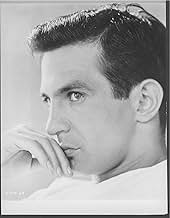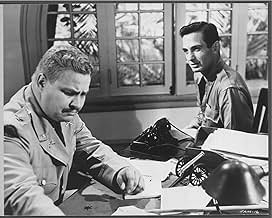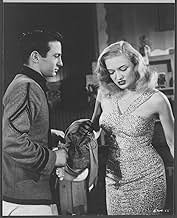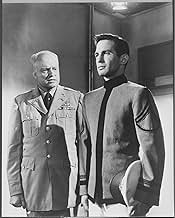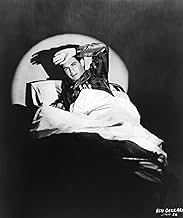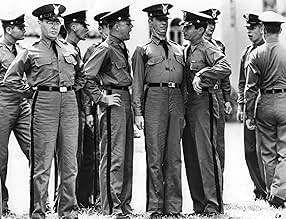IMDb-BEWERTUNG
6,9/10
1426
IHRE BEWERTUNG
Füge eine Handlung in deiner Sprache hinzuStudents faced with an ethical dilemma about the dehumanization associated with the tradition of hazing, at a military college in the Southern United States, take matters in their own hands.Students faced with an ethical dilemma about the dehumanization associated with the tradition of hazing, at a military college in the Southern United States, take matters in their own hands.Students faced with an ethical dilemma about the dehumanization associated with the tradition of hazing, at a military college in the Southern United States, take matters in their own hands.
Peter Mark Richman
- Cadet Colonel Corger
- (as Mark Richman)
Vergel Cook
- Jo
- (Nicht genannt)
Empfohlene Bewertungen
An interesting look at gay themes from the 1950s. At the time this movie came pout, homosexuality was still a crime in most (maybe all) states. It had another decade and a half to go before being declassified as mental illness.
This opens with a drawing that looks like Tom of Finland. The people involved in making this may never have heard of Tom of Finland. It was the stylized gay zeitgeist. (I guess. I was not there.) Ben Gazzara plays the central character. He is a horrible, thoroughly unlivable bully. It all takes place at a military academy. A fey student who seems to worship him, despite his cruelty, is writing a novel based on his life. It's called "Nightboy." And John Rechy was still a youngster! It's a worthwhile movie. The acting is good all around. The plot is not entirely plausible. But it's exciting and consistently well done.
This opens with a drawing that looks like Tom of Finland. The people involved in making this may never have heard of Tom of Finland. It was the stylized gay zeitgeist. (I guess. I was not there.) Ben Gazzara plays the central character. He is a horrible, thoroughly unlivable bully. It all takes place at a military academy. A fey student who seems to worship him, despite his cruelty, is writing a novel based on his life. It's called "Nightboy." And John Rechy was still a youngster! It's a worthwhile movie. The acting is good all around. The plot is not entirely plausible. But it's exciting and consistently well done.
Ben Gazzara stars (in his film debut) in this military drama about a vicious Alpha male getting his comeuppance from 1957. Gazzara is the big dog at this military academy where he rules w/an iron hand making his fellow cadets cower in his wake. Things take a turn when he messes w/the son of the commander (getting him drunk where in a fit of rage & trickery he ends up beating up another) prompting Gazzara to visit the commander's office where in a turn of events, Gazzara threatens him! Finally the rest of the cadets band together to confront Gazzara where he'll either talk the talk or walk the walk. Adapted from his novel, Calder Willingham (The Graduate) eschews a sadistic hierarchy among the soldiers who are at a point in their careers when they're the most malleable & impressionistic, letting Gazzara hold sway over them like some fascist keeping his underlings beneath the knuckles of his tyranny. There is also (whether intentional or not) an undercurrent of homo-eroticism, since women are almost non-existent on the campus, letting our despot control his minions w/every tool in his arsenal. Also starring Pat Hingle (Commissioner Gordon from Tim Burton's Batman series) as one Gazzara's loyal boys, Clifton James as a military higher up & George Peppard (from the A-Team in his film debut) as one of the cadets who fight back.
Back in the 1950s the movie Production Code in the U.S. censored topics and dialogue that it considered morally offensive or too provocative for a general audience. To get around this, Hollywood disguised the plot and dialogue in some films. The disguise allowed the presentation of underlying subversive themes, but in veiled form. "The Strange One" is a film with a provocative premise rendered opaque by its plot and dialogue.
A Machiavellian-minded Cadet named Jocko DeParis (Ben Gazzara) throws his weight around at a Southern military academy. DeParis is a terrible human being: bullying, manipulative, and sadistic, yet unemotional, always in control of the situation. In the film's plot, he carries through on a well-thought-out scheme to have a cadet he doesn't like expelled. He uses other cadets to implement his plan, so that he personally cannot be blamed. One of his puppet cadets is a visually unappealing Cadet Simmons (Arthur Storch), a guy with a mouth full of conspicuous teeth, who doesn't approve of alcohol and doesn't like women.
Another Cadet in Jocko's orbit is Perrin, (a.k.a Cockroach), a slightly effeminate guy, played by Paul Richards. Cockroach hero-worships Jocko, which thus allows Jocko to humiliate him in front of others. Yet, Cockroach, who refers to Jocko as "Night Boy", has his own plans, disguised by the script's dialogue, when he tells Jocko: "All I want to have is your confidence and your friendship". Well, you can see where this is headed in one sense, though the plot implies something else. The dialogue is heavy on subtext. And the film was quite subversive in its day.
The film's B&W visuals are rather dark, in keeping with the story's subversive theme. A jazzy score amplifies the seedy nature of these inter-relationships. The film's casting and acting are quite good, Arthur Storch's bizarre performance notwithstanding.
On the negative side, the plot doesn't explain why Jocko had such a grudge against others at the academy, nor do we learn the basis for his apparent political hold on the academy's higher-ups.
Yet these are fairly minor issues. And my overall impression of "The Strange One" is highly favorable. In addition to a deeply thematic story, we get to see a number of actors early in their careers, including Gazzara, Pat Hingle, James Olson, and George Peppard, among others. This is a film that would have been all but forgotten had it not been released recently on DVD. It's worth a look.
A Machiavellian-minded Cadet named Jocko DeParis (Ben Gazzara) throws his weight around at a Southern military academy. DeParis is a terrible human being: bullying, manipulative, and sadistic, yet unemotional, always in control of the situation. In the film's plot, he carries through on a well-thought-out scheme to have a cadet he doesn't like expelled. He uses other cadets to implement his plan, so that he personally cannot be blamed. One of his puppet cadets is a visually unappealing Cadet Simmons (Arthur Storch), a guy with a mouth full of conspicuous teeth, who doesn't approve of alcohol and doesn't like women.
Another Cadet in Jocko's orbit is Perrin, (a.k.a Cockroach), a slightly effeminate guy, played by Paul Richards. Cockroach hero-worships Jocko, which thus allows Jocko to humiliate him in front of others. Yet, Cockroach, who refers to Jocko as "Night Boy", has his own plans, disguised by the script's dialogue, when he tells Jocko: "All I want to have is your confidence and your friendship". Well, you can see where this is headed in one sense, though the plot implies something else. The dialogue is heavy on subtext. And the film was quite subversive in its day.
The film's B&W visuals are rather dark, in keeping with the story's subversive theme. A jazzy score amplifies the seedy nature of these inter-relationships. The film's casting and acting are quite good, Arthur Storch's bizarre performance notwithstanding.
On the negative side, the plot doesn't explain why Jocko had such a grudge against others at the academy, nor do we learn the basis for his apparent political hold on the academy's higher-ups.
Yet these are fairly minor issues. And my overall impression of "The Strange One" is highly favorable. In addition to a deeply thematic story, we get to see a number of actors early in their careers, including Gazzara, Pat Hingle, James Olson, and George Peppard, among others. This is a film that would have been all but forgotten had it not been released recently on DVD. It's worth a look.
This film is a real sleeper. It launched some brilliant careers, especially that of Ben Gazzara. But also those of Pat Hingle, George Peppard and Arthur Storch, who became a fine stage director. Look for this one to see some interesting characters and a compelling story.
Originally advertised as the first picture filmed entirely by a cast and technicians from the Actor's Studio, this tale of power play amongst the cadets of a Southern military academy, only comes alive when it features the material that the Production Code of the 1950's demanded be cut.
Based on the autobiographical novel and play End as a Man by Calder Willingham, director Jack Garfein uses the music of Kenyon Hopkins noticably in the scenes between Ben Gazzara as an upperclass man and Paul E Richards as a presumably gay cadet Gazzara nicknames Cockroach, who wears a shower cap when the other cadets don't. Richards is a "creative writer" who names the Gazzara character in his novel "nightboy". Their best scene together is where Richards reads to Gazzara, who plays with his sword! Clearly Gazzara is not adverse to Richard's attention, and their farewell handshake is more a sensual than manly experience. Gazzara's relationship with Richards is also echoed in his friendship with football jock James Olson, where Gazzara reacts to being casually touched. I also like idea of Gazzara's cigarette holder, though his kissing his own wrist at one point is a little too self-consciously Method.
But whilst it is interesting to observe these subversive (for the period) elements, the narrative ultimately disappoints in the treatment of Gazzara as the academy's resident sadist. The Actors Studio adaptation needs to create an ensemble, as opposed to allowing Gazzara to star, which dissipates the tension and reduces his threat. Whilst it may be more psychologically truthful for him to underplay his psychotic nature, with the addition of Freudian insight which makes him more intellectual than physically violent, this doesn't help the drama, which is even more obvious when the far more satisfying climax uses mob intimidation and a physical act of revenge.
The worst of the Actors Studio excess is in the presentation of victim Arthur Storch who is said to be schizophrenic and thus an easy target. Storch has coke-bottle spectacles, buck teeth, cartoon at attention posture, ambition to become a priest, is a mommy's boy, afraid of women, and anti-alcoholic. Gazzara's interest in Storch is inexplicable, even if he does hold him down while Olson spanks him with a broom, but as a good part of the film has us trapped in one room (the stage origins show here) while we're supposed to observe how bad Gazzara is, proceedings crawl into tedium. Or perhaps this kind of s/m power play just doesn't hold that much interest for me. The academy rooms have cell-like iron gates in front of the doors, and even though they aren't locked, the film opens with a guard hitting each as he passes, doing a role call.
Watch for Gazzara's sci-fi buggy car, which has room in the back for a passenger.
Based on the autobiographical novel and play End as a Man by Calder Willingham, director Jack Garfein uses the music of Kenyon Hopkins noticably in the scenes between Ben Gazzara as an upperclass man and Paul E Richards as a presumably gay cadet Gazzara nicknames Cockroach, who wears a shower cap when the other cadets don't. Richards is a "creative writer" who names the Gazzara character in his novel "nightboy". Their best scene together is where Richards reads to Gazzara, who plays with his sword! Clearly Gazzara is not adverse to Richard's attention, and their farewell handshake is more a sensual than manly experience. Gazzara's relationship with Richards is also echoed in his friendship with football jock James Olson, where Gazzara reacts to being casually touched. I also like idea of Gazzara's cigarette holder, though his kissing his own wrist at one point is a little too self-consciously Method.
But whilst it is interesting to observe these subversive (for the period) elements, the narrative ultimately disappoints in the treatment of Gazzara as the academy's resident sadist. The Actors Studio adaptation needs to create an ensemble, as opposed to allowing Gazzara to star, which dissipates the tension and reduces his threat. Whilst it may be more psychologically truthful for him to underplay his psychotic nature, with the addition of Freudian insight which makes him more intellectual than physically violent, this doesn't help the drama, which is even more obvious when the far more satisfying climax uses mob intimidation and a physical act of revenge.
The worst of the Actors Studio excess is in the presentation of victim Arthur Storch who is said to be schizophrenic and thus an easy target. Storch has coke-bottle spectacles, buck teeth, cartoon at attention posture, ambition to become a priest, is a mommy's boy, afraid of women, and anti-alcoholic. Gazzara's interest in Storch is inexplicable, even if he does hold him down while Olson spanks him with a broom, but as a good part of the film has us trapped in one room (the stage origins show here) while we're supposed to observe how bad Gazzara is, proceedings crawl into tedium. Or perhaps this kind of s/m power play just doesn't hold that much interest for me. The academy rooms have cell-like iron gates in front of the doors, and even though they aren't locked, the film opens with a guard hitting each as he passes, doing a role call.
Watch for Gazzara's sci-fi buggy car, which has room in the back for a passenger.
Wusstest du schon
- WissenswertesBen Gazzara, Pat Hingle, Peter Mark Richman (as Mark Richman), Arthur Storch, and Paul E. Richards played the same roles on stage. The play "End as a Man" opened on Broadway at the Vanderbilt Theatre, 148 W. 48th St. on 14 October 1953 and ran for 105 performances.
- PatzerWhen Jocko and Julie go to the Savanarola Club in town, there is a neon sign in a window with open blinds as seen from the outside. But when they step inside, the blinds in the window are closed and no light from the neon sign is seen.
- VerbindungenFeatured in Ben Gazzara Remembers the Strange One (2009)
Top-Auswahl
Melde dich zum Bewerten an und greife auf die Watchlist für personalisierte Empfehlungen zu.
- How long is The Strange One?Powered by Alexa
Details
- Laufzeit
- 1 Std. 40 Min.(100 min)
- Farbe
- Seitenverhältnis
- 1.85 : 1
Zu dieser Seite beitragen
Bearbeitung vorschlagen oder fehlenden Inhalt hinzufügen


